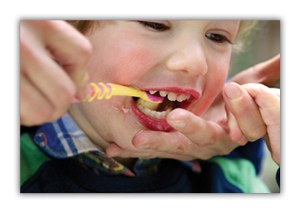Snacking and Cavities
Snacking can cause cavities! (And other things that might surprise you about kids’ teeth)
By PEPS Community Partner, Washington Dental Service Foundation

Experts advise that eating smaller meals throughout the day can help prevent childhood obesity, but there’s a catch. Researchers now know that frequent snacking – or “grazing” – is becoming a major source of tooth decay.
Teeth go through a healing process between meals. When kids snack on crackers all day, or we give kids a bag of fruit chews for a long car ride, the result is a constant attack on the teeth that breaks down the enamel and can quickly turn into cavities.
Here are some more things about snacking that might surprise you.
- How often kids snack – not just what they eat – can be harmful to their teeth. Teeth need breaks between meals and snacks to prevent cavities.
- Carbs cause cavities? Sounds goofy, but starchy foods like snack crackers and bagels quickly turn to sugar and easily get stuck on kids’ teeth. The longer they sit there, the higher the risk.
- Fruit rolls, fruit chews, fruit juice: not really fruit. While there is a dash of fruit juice concentrate and dried fruit in these snacks, the main ingredient is sugar. What’s more, it gets stuck on teeth and eats through the enamel. Result: cavities.
You may be thinking, “They’re just baby teeth.” But think again. Baby teeth are important! Baby teeth serve several important functions. They help children chew food and speak clearly. They also shape the face and guide permanent teeth into place. Here are some tips for keeping your kids’ baby teeth healthy and strong:
- Choose healthy snacks like cheese, yogurt, cucumbers and fresh fruit. Limit cavity causers like cookies, candy, crackers, juice, energy/sport drinks and soda.
- Eat and drink in one sitting instead of sipping and snacking all day long. Have sweets with your meal, and wash them down with water.
- Cavities are preventable. Make sure to brush kids’ teeth twice a day, two minutes at a time, with a small amount of fluoride toothpaste—the size of a grain of rice until age 2, the size of a pea after that. Floss once a day as soon as teeth touch.
- Get your kids’ teeth checked by a dentist or physician by their first birthday, and at least once year after that. Medicaid and most dental insurance plans cover two preventive dental visits each year.
 The nonprofit Washington Dental Service Foundation is working to raise awareness about the importance of baby teeth and the need for early dental disease prevention. For more information, go to www.KidsOralHealth.org.
The nonprofit Washington Dental Service Foundation is working to raise awareness about the importance of baby teeth and the need for early dental disease prevention. For more information, go to www.KidsOralHealth.org.
Document Actions